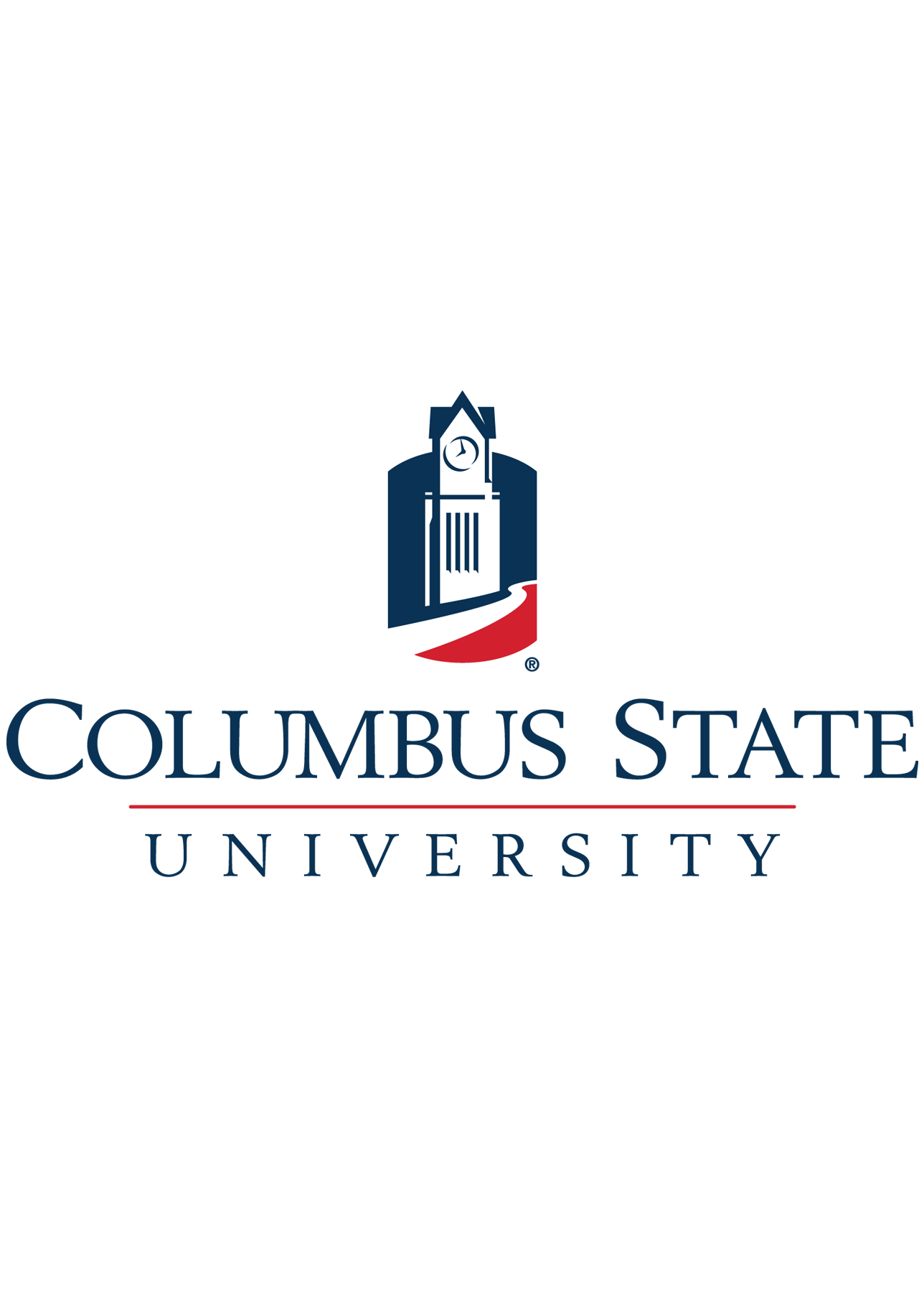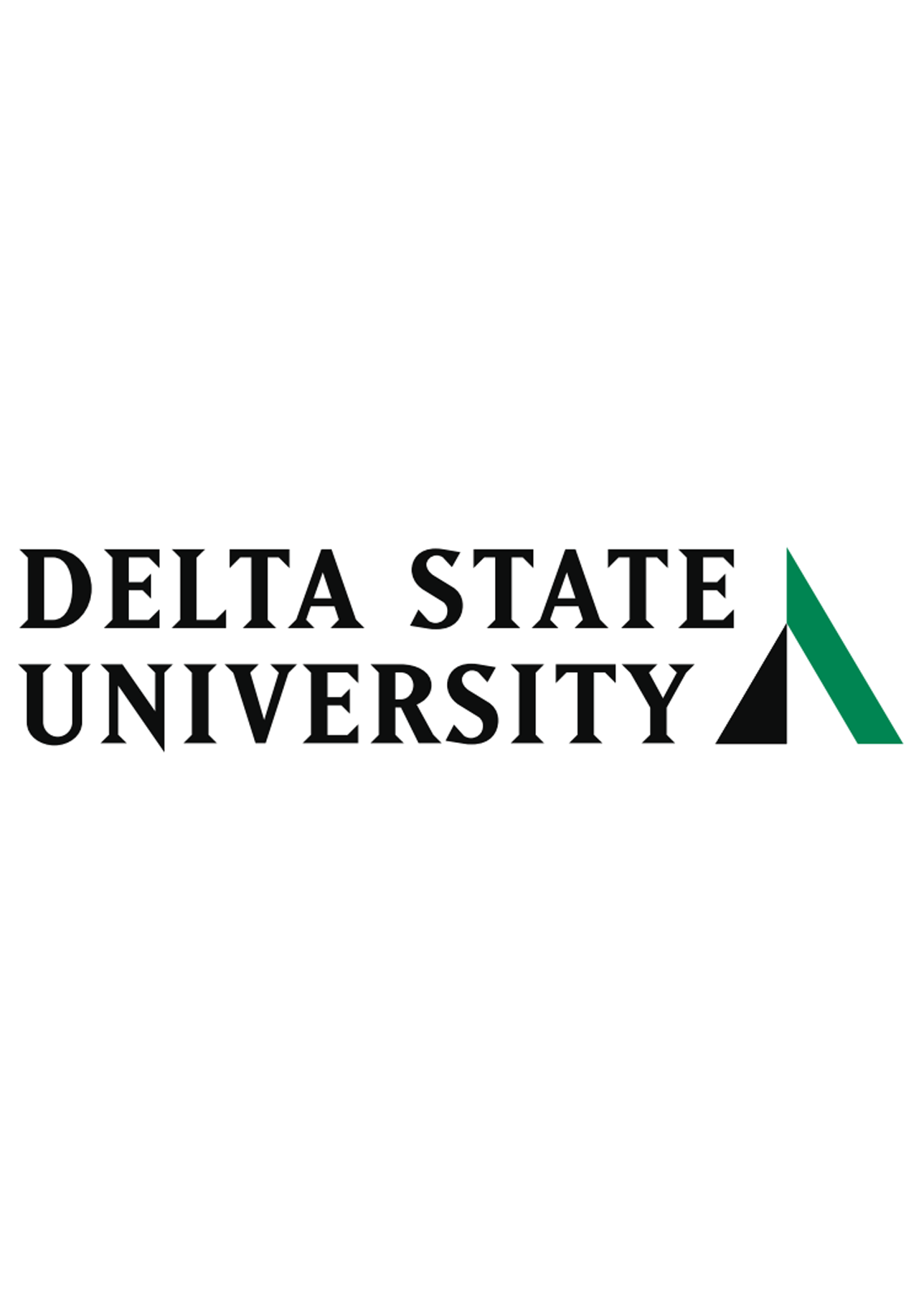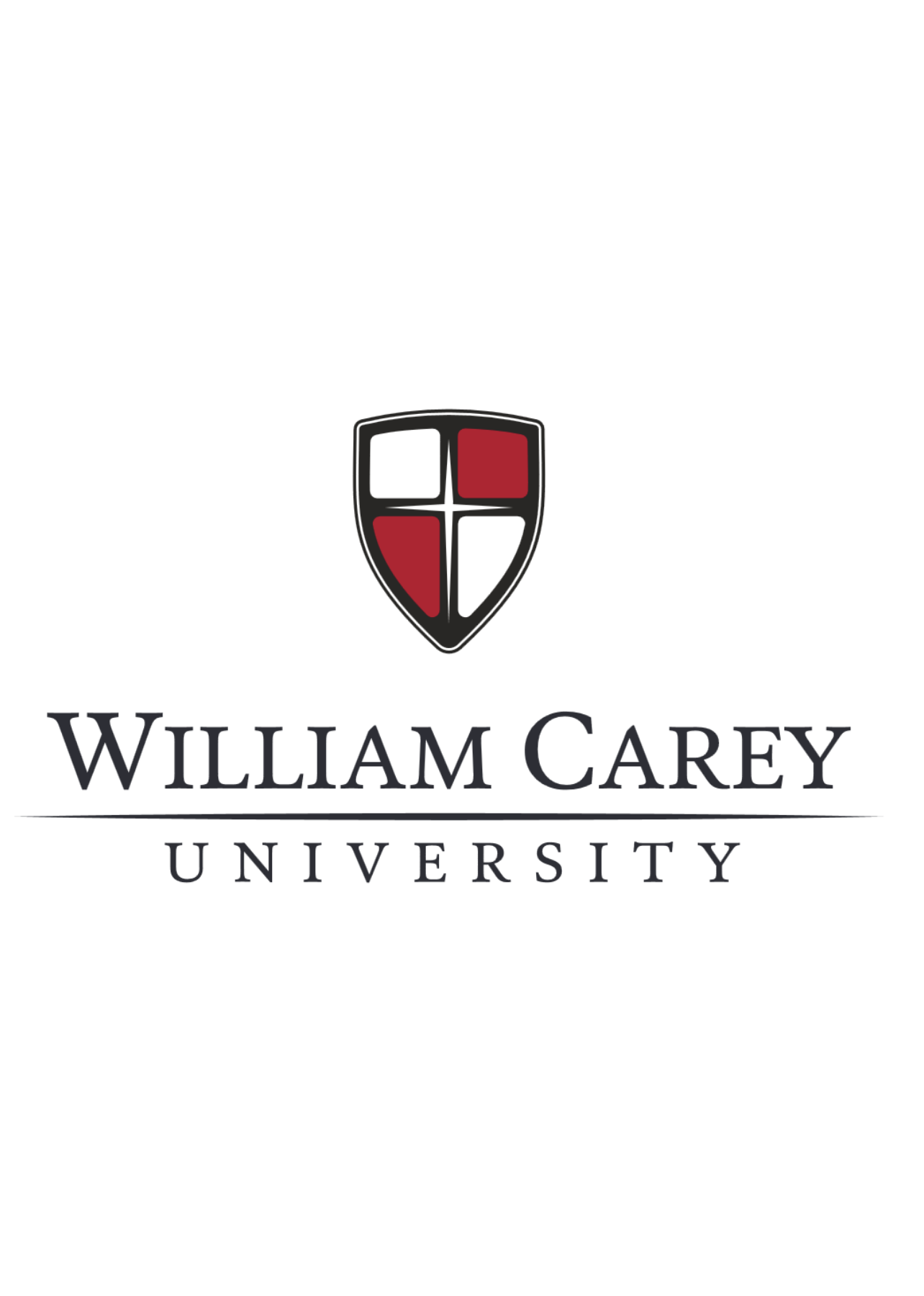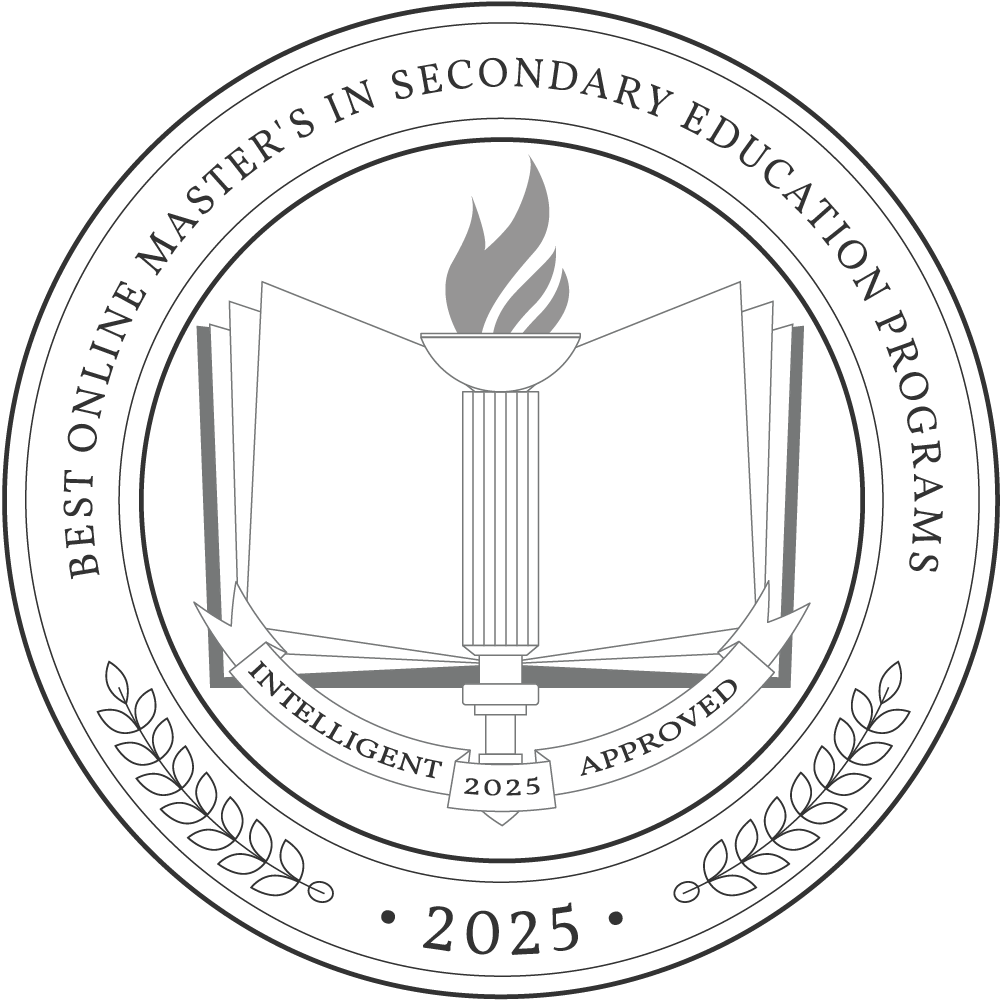The term “secondary education” applies to grades seven through twelve. Individuals enrolled in a master’s program in secondary education are current or aspiring teachers for these grade levels; graduates obtain advanced teaching and curricular planning skills to excel in middle and high school classroom settings. In most cases, the curriculum qualifies as a teacher preparation program that can assist graduates on their path to teacher certification or meet continuing education requirements.
Data from the Bureau of Labor Statistics (BLS) shows that middle and high school teachers earn an average annual salary of around $65,000. This figure can vary based on a school’s location and whether the institution is public or private.
Aspiring secondary education teachers do not need a master’s degree to earn their teaching credentials. Still, this program of study covers additional aspects of the profession, including education technology and school leadership. As such, graduates are well-equipped for advanced positions within the school system. Online master’s in secondary education programs require about two years to complete, and students typically pay $9,000 to $22,000 in total tuition.
Why You Should Trust
The Intelligent.com Higher Education Team is dedicated to providing students with independent, equitable school and program rankings and well-researched resources. Our expert-driven articles cover topics related to online colleges and programs, paying for school, and career outlooks. We use data from the U.S. Department of Education’s College Scorecard, the National Center for Education Statistics, and other reputable educational and professional organizations. Our academic advisory team reviews content and verifies accuracy throughout the year for the most current information. Partnerships do not influence rankings or editorial decisions.
- Analyzed over 2,000 national, accredited, and nonprofit colleges and universities
- 800+ rankings pages are reviewed and updated yearly
- Content is informed by reputable sources, surveys, and interviews with academic advisors and other experts
- Over 100 data points are reviewed for accuracy and quality throughout the year, including sources
How we rank schools
Our list features the best online Secondary Education degree programs at top colleges nationwide. Each school featured is a nonprofit, accredited institution — either public or private — with a high standard of academic quality for post-secondary institutions.
We evaluated each school’s program on tuition costs, admission, retention and graduation rates, faculty, reputation, and the student resources provided for online students. We collected data from trusted sources like the National Center for Education Statistics, individual school and program websites, school admissions counselors, and other data sources. Then, we calculated the Intelligent Score on a scale of 0 to 100 based on the following criterion:
Academic Quality:
- Admission rate versus enrollment rate
- Retention rate of students who return after year one
- Accreditation status (regional and programmatic)
- Nonprofit status, both private and public institutions
Graduation Rate
- Overall graduation rate
- Total number of currently enrolled students, including diversity metrics
- Student-to-faculty ratio
Cost and ROI
- In-state and out-of-state per-credit tuition rates and fees
- Required credits to graduate
- Earning potential after graduation
- Availability of federal student loans, scholarships, and other financial aid options
Student Resources
- Available student services for online-only and hybrid programs
- On-campus amenities like tutoring centers and the number of libraries
Read more about our ranking methodology.
Best 36 Accredited Online Master's in Secondary Education Programs
FiltersInstitution Type
Status
- Intelligent Score
- Alphabetically By University Name
- Acceptance Rate
- Enrollment
- In-state Graduate Tuition
- Out-of-state Graduate Tuition
- In-state Undergraduate Tuition
- Out-of-state Undergraduate Tuition

Georgia College & State University
Intelligent Score: 99.17In-state: $7,508
Out-of-state: $26,688
In-state: $5,292
Out-of-state: $5,292
SAT: 1100-1245
ACT: 23-27
$295
Online
Council for the Accreditation of Educator Preparation
36

The Citadel
Intelligent Score: 98.61In-state: $75
Out-of-state: $75
In-state: $10,740
Out-of-state: $10,740
SAT: 1030-1210
ACT: 21-26
$695
Online, On-Campus
Southern Association of Colleges and Schools Commission on Colleges
45

McDaniel College
Intelligent Score: 98.55In-state: $45,876
Out-of-state: $45,876
In-state: $9,468
Out-of-state: $9,468
SAT: N/A
ACT: N/A
$552
Online
National Council for Accreditation of Teachers
33

Ball State University
Intelligent Score: 97.17In-state: $9,482
Out-of-state: $26,470
In-state: $9,328
Out-of-state: $9,328
SAT: N/A
ACT: N/A
In-State: $464
Out-of-State: $696
Online
Council for the Accreditation of Educator Preparation
30

University of Alabama
Intelligent Score: 97.06In-state: $10,780
Out-of-state: $30,250
In-state: $10,780
Out-of-state: $10,780
SAT: 1070-1330
ACT: 23-31
$440
Online
Council for the Accreditation of Educator Preparation
30

University of Louisiana Monroe
Intelligent Score: 96.23In-state: $5,407
Out-of-state: $19,135
In-state: $5,511
Out-of-state: $5,511
SAT: 1000-1210
ACT: 20-26
$1,044
Online
Council for the Accreditation of Educator Preparation
36-42

Columbus State University
Intelligent Score: 95.98In-state: $4,371
Out-of-state: $15,425
In-state: $6,300
Out-of-state: $6,300
SAT: 860-1080
ACT: 17-23
In-State: $301
Out-of-State: $817
Online
Council for the Accreditation of Counseling and Related Educational Programs
30

Southeast Missouri State University
Intelligent Score: 95.84In-state: $6,779
Out-of-state: $12,951
In-state: $5,373
Out-of-state: $5,373
SAT: N/A
ACT: N/A
$383
Online
Higher Learning Commission
30

Delta State University
Intelligent Score: 95.11In-state: $7,951
Out-of-state: $7,951
In-state: $7,951
Out-of-state: $7,951
SAT: 885-1125
ACT: 18-23
$469
Online
Southern Association of Colleges and Schools Commission on Colleges
33

UMass Global
Intelligent Score: 94.86In-state: $63,560
Out-of-state: $63,560
In-state: $55,460
Out-of-state: $55,460
SAT: Not Required
ACT: Not Required
$730
Online
California Commission on Teacher Credentialing
42

University of Maine
Intelligent Score: 94.03In-state: $9,240
Out-of-state: $30,030
In-state: $8,298
Out-of-state: $8,298
SAT: N/A
ACT: N/A
$567
Online
Council for the Accreditation of Educator Preparation
36

University of North Texas
Intelligent Score: 92.89In-state: $8,295
Out-of-state: $18,111
In-state: $6,350
Out-of-state: $6,350
SAT: 1050-1240
ACT: 20-27
$464
Online
Texas Education Agency
36

Liberty University
Intelligent Score: 89.32In-state: $14,791
Out-of-state: $14,791
In-state: $7,935
Out-of-state: $7,935
SAT: 1040-1250
ACT: 21-29
$415
Online
Council for the Accreditation of Educator Preparation
36

University of Nebraska Omaha
Intelligent Score: 89.22In-state: $7,770
Out-of-state: $24,900
In-state: $6,138
Out-of-state: $6,138
SAT: 1110-1320
ACT: 22-28
Resident: $363
Non-Resident: $820
Online
Higher Learning Commission
36

Georgia Southern University
Intelligent Score: 89.15In-state: $4,371
Out-of-state: $15,425
In-state: $4,986
Out-of-state: $4,986
SAT: 993-1170
ACT: 18-24
In-State: $284
Out-of-State: $1,160
Online
Southern Association of Colleges and Schools Commission on Colleges
39

Texas A&M University - Commerce
Intelligent Score: 88.7In-state: $8,395
Out-of-state: $36,849
In-state: $6,775
Out-of-state: $6,775
SAT: 1160-1380
ACT: 26-32
Resident: $407
Non-Resident: $815
Online
Southern Association of Colleges and Schools Commission on Colleges
36

Clemson University
Intelligent Score: 86.94In-state: $14,118
Out-of-state: $37,110
In-state: $10,600
Out-of-state: $10,600
SAT: 1210-1390
ACT: 27-32
$515
Online
Council for the Accreditation of Educator Preparation
30

William Carey University
Intelligent Score: 86.09In-state: $12,600
Out-of-state: $12,600
In-state: $11,040
Out-of-state: $11,040
SAT: 1050-1330
ACT: 20-27
$475
Online
Council for the Accreditation of Educator Preparation
30
How to Choose an Online Master’s in Secondary Education Program
Choose your area of study
This degree is typically offered as a Master of Education (MEd) or Master of Arts (MA). Most programs will allow you to select a concentration and focus on teaching a particular subject area, such as biology, chemistry, English, mathematics, or social studies. Carefully consider what kind of role you would like to have after you graduate, then look for programs that closely match these career goals.
Research schools and programs
You should only apply to institutions that have been approved by a DOE-recognized regional accrediting organization, such as the New England Commission of Higher Education or Northwest Commission on Colleges and Universities. These organizations evaluate schools to ensure they provide students with a high-quality education. Those who attend a school that isn’t regionally accredited may be unable to access financial aid or transfer credits to another institution if needed.
Ideally, your master’s in secondary education program will also be accredited by a respected industry group like the Council for the Accreditation of Educator Preparation (CAEP). This accrediting organization has particularly high standards for education-related programs.
Besides accreditation, there are several other factors to compare between online master’s programs:
- Do online students have additional benefits? Each school’s website should list any supplemental benefits and support services available to online students. Consider prioritizing programs that include tutoring, mental health services, academic advising, and other student success resources.
- How is hands-on practice integrated into the program? Field experience is a critical piece of the teaching profession. Online graduate degrees in secondary education that lead to teaching certification will incorporate several practical teaching experiences, including observing, assisting, and student-teaching. Research each program’s expectations and how it facilitates these experiences.
To learn more about any schools that you’re interested in, you can visit the school’s website, contact an admissions counselor, follow the school on social media, or attend an in-person or virtual open house.
Prepare for tests and applications
Application requirements vary by school and program. In most cases, you will need a related bachelor’s degree with at least a 2.75 GPA (though many institutions prefer a 3.0).
For programs that lead to teacher certification, your undergraduate coursework needs to meet state-specific content requirements for your chosen certification area. Otherwise, you may need to enroll in specific prerequisite courses or submit PRAXIS scores.
Plan for application dates. Acquiring transcripts and letters of recommendation can take several weeks. A personal statement may be required as well. You should always contact an admissions counselor to ensure you have the most accurate information regarding requirements and deadlines.
Select your program
Before making your final decision, review your needs and goals again. Do you plan to attend school full-time or part-time? Do you want your program to be as online as possible, or are you fine with a hybrid program that has a fair amount of in-person requirements? Some programs offer asynchronous courses, which can be completed at your own pace, while others only offer synchronous courses, which involve remotely attending lectures and completing assignments at the same time as other students — which of these two online learning formats do you prefer? Your school should accommodate your scheduling needs and learning preferences.
Determine how you’ll pay for your degree
Submit your FAFSA to determine whether you qualify for federal grants or affordable loan opportunities. Students with a military background should speak to the school’s veterans affairs office, as they may be able to receive tuition benefits for their, or their family member’s, service. Or, if you already work within the teaching profession, consider whether your employer provides tuition assistance benefits or professional development funding. From there, speak with your school’s financial aid office to discuss any other funding sources you might qualify for.
What Can You Expect from an Online Master’s in Secondary Education Program?
Online secondary education programs are designed for current teachers preparing for leadership positions in the education field or for individuals hoping to enter the teaching profession. Some degree programs lead to teacher certification in the state where graduates aspire to practice.
Students will learn about student development and learning theory, research methods, and educational technology. They will also engage in coursework specific to teaching their chosen subject area. Nearly all secondary education programs include a teaching practicum where students apply their theoretical knowledge to a classroom setting. Full-time attendees can graduate in as little as 12 months, though most programs require a two-year commitment.
Potential courses you’ll take in an online master’s in secondary education program
- Child/Adolescent Development. Participants develop a general framework for adolescent development’s cognitive, social-emotional, and physical aspects. Students discuss how to apply those theories to the classroom setting.
- English Language Arts Methods and Assessments. This course is for students concentrating in English and language arts instruction. Participants learn how to design and implement curricula for middle and high school classes.
- Introduction to Inclusion and Exceptional Education. Students receive an overview of the issues and practices of teaching special needs learners. Coursework includes strategies for meeting the classroom needs of neurodivergent students.
- Classroom Environment and Management. Participants learn strategies for creating inclusive classroom spaces. Students discuss age-appropriate interventions and practices for responding to individuals with behavioral issues.
What Can You Do With an Online Master’s in Secondary Education?
Career outlook
Advancements in educational technology and evolving teaching methods require educators who are adaptable, knowledgeable, and equipped to meet the diverse needs of students. Online learning platforms, blended classrooms, and personalized instruction have transformed secondary education, creating opportunities for educators to make a lasting impact on their students’ academic and personal development.
Although most of those graduating with a master’s in secondary education are likely to take positions as classroom teachers, there are a number of other occupations open to them with this credential. Some of the most common jobs for workers with this degree include:
- Middle school teacher — Help students advance their understanding of the subjects they learned in elementary school and prepare them for the subjects that will be covered in high school.
- Median annual salary: $64,290
- Projected employment growth (through 2032): 1%
- New job openings projected: 42,200 annually
- High school teacher — Teach students the knowledge and skills they will need to enter the job market or pursue further education.
- Median annual salary: $65,220
- Projected employment growth (through 2032): 1%
- New job openings projected: 67,100 annually
- Instructional coordinator — Develop, implement, and assess the effectiveness of educational materials.
- Median annual salary: $74,620
- Projected employment growth (through 2032): 2%
- New job openings projected: 19,200 annually
Online Master’s in Secondary Education Degree Frequently Asked Questions
How do I apply to an online master's in secondary education degree program?
To apply to an online master’s in secondary education program, compile the following materials:
- A completed master’s program application
- Official transcripts from all undergraduate institutions
- PRAXIS test scores — if required
- A personal statement
- Recommendation letters
- A current resume
- Proof of English proficiency
- A processing fee
Before officially submitting your application, contact the school’s admissions counselor. They may be able to waive the application fee or help you confirm that all of your materials are in order.
How much does an online master's in secondary education degree cost?
According to U.S. News & World Report, an online master’s in secondary education usually costs between $9,000 to $22,000 in total tuition. Some schools charge extra technology fees for online attendees, and all students, regardless of their program, tend to pay library and student services fees. You will also need to cover the cost of books and personal devices (such as your computer, webcam, microphone, and associated software needs).
How long does it take to earn an online master's in secondary education degree?
Online graduate programs in secondary education require between 30 and 36 credit hours. Some accelerated programs take 12 to 18 months, though most full-time students graduate within two years. Part-time students will need between two and four years to finish.
Is an online master's in secondary education worth it?
Pursuing an online master’s degree in secondary education offers the potential for a rewarding and impactful career. This advanced degree equips educators with the specialized knowledge, teaching strategies, and leadership skills needed to excel in secondary school settings.
Online master’s programs in secondary education provide a flexible option for students, enabling them to earn their degree while balancing work and personal commitments. Virtual learning platforms offer access to innovative teaching techniques, instructional technology, and collaborative opportunities.
The networking opportunities provided by an online master’s program are invaluable. Students can connect with peers, mentors, and education experts, sharing ideas, best practices, and insights that enhance their teaching effectiveness and professional growth.
Read More about Online Master’s in Secondary Education Degrees
Compare School Options
Related Degrees
- Reading and Literacy
- Elementary Education
- Curriculum and Instruction
- Gifted and Talented Education
- Educational Leadership
- Graduate Certificate in Elementary Education
- Coaching
- Assessment and Measurement
- Adult Education
- Science Education

